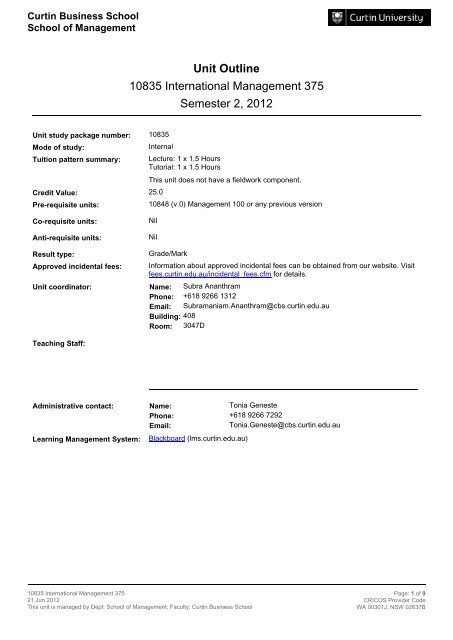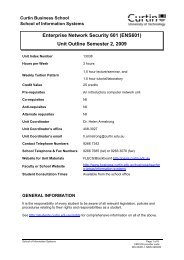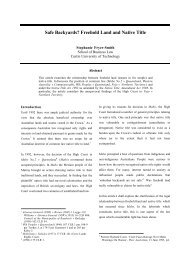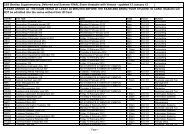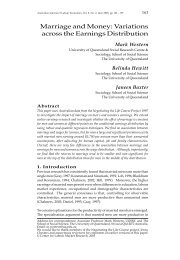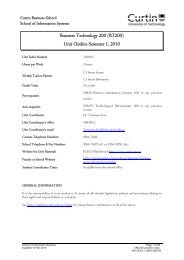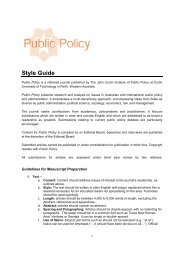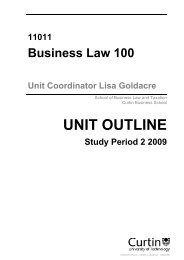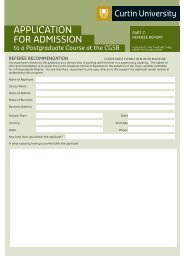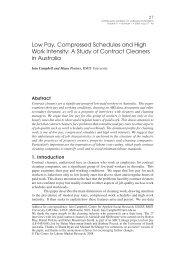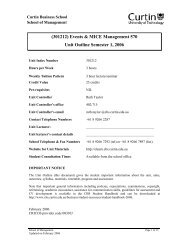Unit Outline 10835 International Management 375 Semester 2, 2012
Unit Outline 10835 International Management 375 Semester 2, 2012
Unit Outline 10835 International Management 375 Semester 2, 2012
You also want an ePaper? Increase the reach of your titles
YUMPU automatically turns print PDFs into web optimized ePapers that Google loves.
Curtin Business School<br />
School of <strong>Management</strong><br />
<strong>Unit</strong> <strong>Outline</strong><br />
<strong>10835</strong> <strong>International</strong> <strong>Management</strong> <strong>375</strong><br />
<strong>Semester</strong> 2, <strong>2012</strong><br />
<strong>Unit</strong> study package number: <strong>10835</strong><br />
Mode of study:<br />
Tuition pattern summary:<br />
Internal<br />
Credit Value: 25.0<br />
Pre-requisite units:<br />
Lecture: 1 x 1.5 Hours<br />
Tutorial: 1 x 1.5 Hours<br />
This unit does not have a fieldwork component.<br />
10848 (v.0) <strong>Management</strong> 100 or any previous version<br />
Co-requisite units:<br />
Anti-requisite units:<br />
Result type:<br />
Approved incidental fees:<br />
<strong>Unit</strong> coordinator:<br />
Nil<br />
Nil<br />
Grade/Mark<br />
Information about approved incidental fees can be obtained from our website. Visit<br />
fees.curtin.edu.au/incidental_fees.cfm for details.<br />
Name: Subra Ananthram<br />
Phone: +618 9266 1312<br />
Email: Subramaniam.Ananthram@cbs.curtin.edu.au<br />
Building: 408<br />
Room: 3047D<br />
Teaching Staff:<br />
Administrative contact: Name: Tonia Geneste<br />
Phone: +618 9266 7292<br />
Email:<br />
Tonia.Geneste@cbs.curtin.edu.au<br />
Learning <strong>Management</strong> System: Blackboard (lms.curtin.edu.au)<br />
<strong>10835</strong> <strong>International</strong> <strong>Management</strong> <strong>375</strong><br />
21 Jun <strong>2012</strong><br />
This unit is managed by Dept: School of <strong>Management</strong>; Faculty: Curtin Business School<br />
Page: 1 of 9<br />
CRICOS Provider Code<br />
WA 00301J, NSW 02637B
Curtin Business School<br />
School of <strong>Management</strong><br />
Acknowledgement of Country<br />
We respectfully acknowledge the Indigenous Elders, custodians, their descendants and kin of this land past and<br />
present.<br />
Syllabus<br />
This unit acquaints students with current international management theory and practice, encouraging interest and<br />
enthusiasm for an international business career. It provides students with an introduction to methodologies for studying<br />
management from a comparative perspective, and highlights the emerging issues for an international manager. The<br />
practical issues of adaptation needed in cross-cultural or cross-national managerial interfaces are considered<br />
extensively and students learn to analyse management problems and generate solutions to real-life issues and<br />
problems.<br />
Introduction<br />
Welcome to <strong>International</strong> <strong>Management</strong> <strong>375</strong>. The unit is vital for students interested in a career in international business<br />
and is designed to assist their appreciation and understanding of the importance of cross-cultural issues in doing<br />
business across various national contexts.<br />
Learning Outcomes<br />
On successful completion of this unit students can:<br />
1 Identify and explain the key factors that shape management approaches in international<br />
organisations<br />
2 Apply relevant concepts and theories to analysing and solving international management<br />
problems and issues<br />
3 Analyse the importance of external disciplines in relation to international management (e.g.<br />
economics, geography, history, languages, law, and political science)<br />
4 Develop cross-cultural skills and awareness and apply these to oral presentations and seminar<br />
interactions<br />
Curtin's Graduate Attributes<br />
Apply discipline knowledge<br />
Thinking skills<br />
(use analytical skills to solve problems)<br />
Graduate<br />
Attributes<br />
addressed<br />
Information skills<br />
(confidence to investigate new ideas)<br />
Communication skills<br />
<strong>International</strong> perspective<br />
(value the perspectives of others)<br />
Technology skills<br />
Cultural understanding<br />
(value the perspectives of others)<br />
Learning how to learn<br />
(apply principles learnt to new situations)<br />
(confidence to tackle unfamiliar problems)<br />
Professional Skills<br />
(work independently and as a team)<br />
(plan own work)<br />
Find out more about Curtin's Graduate attributes at the Office of Teaching & Learning website: otl.curtin.edu.au<br />
Learning Activities<br />
Students are provided with a solid theoretical, practical and integrated understanding of the core international<br />
management paradigms relevant to contemporary organisations. Lectures provide the theoretical basis and<br />
understanding of the international management concepts. Tutorials provide an opportunity for students to apply and<br />
discuss the theory learned in lectures, to practical examples. Real-life cases are used to demonstrate how theory can be<br />
applied in practice. This format allows students to develop some of the particular communication (written, presentation<br />
and teamwork) skills that employers seek in university graduates.<br />
<strong>10835</strong> <strong>International</strong> <strong>Management</strong> <strong>375</strong><br />
21 Jun <strong>2012</strong><br />
This unit is managed by Dept: School of <strong>Management</strong>; Faculty: Curtin Business School<br />
Page: 2 of 9<br />
CRICOS Provider Code<br />
WA 00301J, NSW 02637B
Curtin Business School<br />
School of <strong>Management</strong><br />
Learning Resources<br />
Essential Texts<br />
You will need to purchase the following textbook(s) in order to complete this unit:<br />
Deresky, H. 2011. <strong>International</strong> <strong>Management</strong>: Managing Across Borders and Cultures. 7th ed. Upper<br />
Saddle River: Pearson. IMPORTANT NOTE: Several versions of the core textbook have been published,<br />
including an Asian and an Australian version. Students must use the international edition (ISBN-10:<br />
01/0132545551 ISBN-13: 978-0132545556). The alternative books do not contain key required materials. The<br />
companion website for this text that will be attached to the new books contains valuable resources for students<br />
and includes an interactive student study guide.<br />
Other Resources<br />
Recommended Texts<br />
You do not have to purchase the following textbooks but you may like to refer to them.<br />
Adler, N., 2002.<br />
<strong>International</strong> Dimensions of Organisational Behaviour. 4 th ed. Boston: Thomson, South Western.<br />
Bartlett, C. A., and S. Ghoshal. 1992. Transnational <strong>Management</strong>: Text, Cases, and Readings in Cross Border<br />
<strong>Management</strong>. Homewood, Illinios: Irwin, Inc.<br />
Ball D., McCulloch, W. H., Geringer, M., and Minor, M. S. 2002. <strong>International</strong> Business: The Challenge of Global<br />
Competition. 9 th ed. Boston: McGraw-HillIrwin.<br />
Czinkota, M.R., Ronkainen, I.A., and M. H. Moffett. 2005. <strong>International</strong> Business. 7 th ed. Thomson, South Western:<br />
Ohio.<br />
Fisher, G., Hughes, R., Griffin, R, and Pustay, M. 2006. <strong>International</strong> Business: Managing in the Asia Pacific. 3 rd ed.<br />
Pearson Education: Frenchs Forest, NSW.<br />
Hill, C. 2002.<br />
<strong>International</strong> Business: Competing in the Global Marketplace: Postscript 2002. Boston: IrwinMcGraw-Hill.<br />
Hodgetts, R., and F. Luthans. 2003. <strong>International</strong> <strong>Management</strong>: Culture, Strategy and Behaviour. 5 th ed. Boston:<br />
IrwinMcGraw-Hill Inc.<br />
Holt, D. H., and K. W. Wigginton. 2002. <strong>International</strong> <strong>Management</strong>. 2 nd ed. Fort Worth: Harcourt College.<br />
McFarlin, D. B. and P. D. Sweeney. 2006. <strong>International</strong> <strong>Management</strong>: Strategic opportunities and cultural challenges.<br />
3 rd ed. Cincinnati, Ohio: South-Western College Publishing.<br />
Thomas, D.C. 2002. Essentials of <strong>International</strong> <strong>Management</strong>: A Cross Cultural Perspective. Thousand Oaks: Sage<br />
Publications.Wild, J. J.,<br />
Wild, K. L., Han, J. C. Y., and Rammal, H. G. 2007. <strong>International</strong> Business: The Challenges of Globalisation. Pearson<br />
Education: Frenchs Forest, NSW.<br />
Assessment<br />
Assessment Schedule<br />
Task Value % Date Due<br />
<strong>Unit</strong> Learning<br />
Outcome(s)<br />
Assessed<br />
1 Portfolio 35 percent TBA 1,3,4<br />
2 Written Assignment 30 percent TBA 2,3,4<br />
3 Final Examination 35 percent TBA 1,2,3<br />
Detailed information on assessment tasks<br />
<strong>10835</strong> <strong>International</strong> <strong>Management</strong> <strong>375</strong><br />
21 Jun <strong>2012</strong><br />
This unit is managed by Dept: School of <strong>Management</strong>; Faculty: Curtin Business School<br />
Page: 3 of 9<br />
CRICOS Provider Code<br />
WA 00301J, NSW 02637B
Curtin Business School<br />
School of <strong>Management</strong><br />
1. Assessment 1: Portfolio - Tutorial Preparation and Case Study Facilitation<br />
Worth: 35% overall<br />
PART A: Tutorial Preparation – Solutions to Tutorial Activities [Weeks 3-11 = 2.5 marks per week scaled<br />
up to 25 marks total]<br />
Due: 4 pm Monday of Teaching Week 11.<br />
Starting week 3 (upto week 11), you are required to prepare solutions to the set tutorial activities on a weekly<br />
basis. You are required to compile and submit the weekly solutions as a single portfolio document online<br />
by the due date and time. The preparation component will help you learn and understand each weekly topic.<br />
Students are expected to conduct additional research to substantiate their responses. It is expected that each<br />
week’s solution will have a MAXIMUM word count of 750 words.<br />
Your tutor will go through the solutions in class on a weekly basis. You are required to discuss your solutions of<br />
the weekly set tutorial activities in class. You are strongly encouraged to share your ideas and add value by<br />
participating in class discussions.<br />
You will be assessed based on the marking guide available on Blackboard against the five criteria (for each<br />
weeks solution), namely, completeness, understanding, research, analysis and writing mechanics.<br />
ONLINE SUBMISSION: The compiled document MUST BE submitted through the blackboard. You need to go<br />
to ‘Assessments’ then you need to click on the link ‘Tutorial Preparation’ ‘View/Complete’ assessment with your<br />
tutorial class or campus location that has the TURNITIN logo. There is NO need to submit a HARD COPY of<br />
your assessment. Your tutor &/or local lecturer will have access to your assessment in soft copy<br />
through the system.<br />
PART B: Case Study Facilitation – [10 Marks total] Due - Once during the semester (weeks 3-11)<br />
You will be required to prepare for, and facilitate the discussion on that week’s end of chapter case study from<br />
the text book. You will be assessed based on the case study facilitation marking guide available on the<br />
blackboard that will look mainly into your preparation, contribution to, and control of, case study questions and<br />
discussions using the five criteria in this marking rubric.<br />
The tutorial preparation and case study facilitation is worth 35 marks in total and will be marked against the<br />
following general criteria<br />
Evidence of completing preliminary reading & preparation activities from Blackboard<br />
Evidence of applying theoretical knowledge to analysing the set weekly case study problems<br />
Evidence of research into other organisations and theories that demonstrate practical application of the<br />
theory<br />
Contributing thoughtful comments and questions to group and class discussions<br />
Actively enabling other class members to participate in discussions<br />
Preparation and facilitation of discussions in the weeks you are a designated discussion leader<br />
Your tutor will assess each student in accordance with the assessment criteria listed above.<br />
<strong>10835</strong> <strong>International</strong> <strong>Management</strong> <strong>375</strong><br />
21 Jun <strong>2012</strong><br />
This unit is managed by Dept: School of <strong>Management</strong>; Faculty: Curtin Business School<br />
Page: 4 of 9<br />
CRICOS Provider Code<br />
WA 00301J, NSW 02637B
Curtin Business School<br />
School of <strong>Management</strong><br />
2. Assessment 2 – Research Report - Group<br />
Worth: 30%<br />
Due: 4pm Monday of teaching week 8<br />
Based on study groups (4 students per group maximum), students are required to prepare a 3000 word (plus or<br />
minus 300 words) research report, based on the set research topic. Papers are due by 4pm on the Monday of<br />
teaching week 8. While the system will be allowed to accept any late submissions, the system will mark those as<br />
late. Late papers will be penalised at the rate of 10% for each calendar day the assignment is late. Papers<br />
submitted or e-mailed in after seven calendar days (without prior arrangement with and approval of the <strong>Unit</strong><br />
Coordinator) will not be assessed and will receive a zero mark. The research report must be submitted in soft<br />
copy online. Please see below further details of online submission.<br />
You will be assessed on your ability to recognise, analyse and discuss the key issues in the topic; and on your<br />
ability to appropriately use reference material in support of your arguments. The quality of the sources of<br />
information you use, as well as your referencing skills (e.g. establishing linkages amongst the sources used<br />
within the assignment etc…), will be assessed. Written assignments must use the Chicago Referencing System<br />
16 and papers that are unsatisfactorily referenced will be unmarked and students will be notified. You are<br />
expected to use at least twelve (12) different academic sources to support your arguments and discussion. The<br />
use of WIKIPEDIA online encyclopaedia is not allowed. This is not an essay task, it is a REPORT.<br />
It is<br />
your responsibility to understand the format of a report. There are numerous business communication books<br />
that will show you the format/layout if you are unsure of what is required. In addition, our CBS Skills and<br />
Communications Centre provide ‘high flyers’ to assist you in your writing. It is worth it to check their website: htt<br />
p://www.business.curtin.edu.au/business/current-students/writing-and-study-skills-support<br />
The Executive Summary needs to be included but is NOT counted in your word count. Please design and<br />
include a cover page in line with the one found on the Blackboard.<br />
ONLINE SUBMISSION: Assignments MUST BE submitted through the blackboard. You need to go to ‘Assessm<br />
ents’ then you need to click on the link ‘Research report’ ‘View/Complete’ assessment with your tutorial class or<br />
campus location that has the TURNITIN logo. There is NO need to submit a HARD COPY of your<br />
assessment. Your tutor &/or local lecturer will have access to your assessment in soft copy through the<br />
system. Please ensure you submit a well-organized and professional assessment (REPORT) INCLUDING<br />
the reference list.<br />
Research Topic<br />
Each group will be required to critically address the research topic (see below) providing supporting examples<br />
where appropriate. Students should be prepared to draw from different sources and provide an evaluation of<br />
relevant scholarly perspectives pertaining to each question covered. Your assessment research topic is:<br />
Explain the role of cross-border joint ventures in the internationalisation process. What are they and why<br />
are they important? Using a case study approach, research one successful and one unsuccessful<br />
cross-border joint venture. Identify and discuss the reasons why one succeeded and the other one failed.<br />
Based on your findings, make recommendations on how organisations can successfully manage<br />
cross-border joint ventures.<br />
The following sections must be included in your report: Executive summary, introduction, main body (use<br />
sub-sections/headings), concluding recommendations and reference list.<br />
NB: Though this research project can be completed without the need to contact any organisation, but in case you<br />
intend to contact any organisation for the purpose of completing this research project, students must provide the<br />
unit Coordinator/lecturer and tutor with full details of the organisation(s) before any such contact is made to allow<br />
the <strong>Unit</strong> Coordinator seek the appropriate ETHICS approval from the University, which might take a long time. F<br />
urther, it is expected that students keep the unit coordinator, &/or local lecturer and tutor fully informed<br />
throughout the semester as any industry or external organisational contacts develop. Indeed, this needs a<br />
special treatment by the university’s research department.<br />
Further assessment information is available on the Blackboard including the key rubric and the marking guide.<br />
<strong>10835</strong> <strong>International</strong> <strong>Management</strong> <strong>375</strong><br />
21 Jun <strong>2012</strong><br />
This unit is managed by Dept: School of <strong>Management</strong>; Faculty: Curtin Business School<br />
Page: 5 of 9<br />
CRICOS Provider Code<br />
WA 00301J, NSW 02637B
Curtin Business School<br />
School of <strong>Management</strong><br />
3.<br />
Assessment 3 – Exam<br />
Worth: 35%<br />
A final examination consisting of two essay type questions (each worth 10%) and one case study (worth 15%)<br />
will be conducted during the examination period. All questions will be based upon course content. It will be a clos<br />
ed book examination. It is recommended that you collate and regularly revise your notes from readings, lectures,<br />
tutorials and YOUR further research. This will assist you to see the main themes and to more clearly understand<br />
key concepts and ideas. By the end of the semester, you should be able to answer questions such as the<br />
following:<br />
How does globalisation impact upon the role of the international manager?<br />
What factors influence national culture?<br />
Describe why a company would choose to adopt a global functional structure.<br />
How can national culture impact upon job motivation?<br />
These are examples of the questions worth 10% each.<br />
The case studies will require students to show an understanding of the concepts related to <strong>International</strong><br />
<strong>Management</strong> and be able to apply those in a practical manner to the case studies provided.<br />
Students are required to list their local lecturer &/or class tutor’s name on the front cover of the examination<br />
booklet. Only examination booklets correctly completed will be marked.<br />
The final exam will be held during the formal examination period. It is the responsibility of the student to<br />
check the date, time and venue of the final examination on the Curtin website. This information will NOT<br />
be provided by the <strong>Unit</strong> Coordinator, the lecturers or tutors.<br />
Fair assessment through moderation<br />
Moderation describes a quality assurance process to ensure that assessments are appropriate to the learning<br />
outcomes, and that student work is evaluated consistently by assessors. Minimum standards for the moderation of<br />
assessment are described in the Assessment Manual, available from<br />
policies.curtin.edu.au/policies/teachingandlearning.cfm<br />
Late penalties<br />
Late Assessment Policy<br />
This ensures that the requirements for submission of assignments and other work to be assessed are fair, transparent,<br />
equitable, and that penalties are consistently applied.<br />
1.<br />
2.<br />
3.<br />
4.<br />
All assessments which students are required to submit will have a due date and time specified on the <strong>Unit</strong><br />
<strong>Outline</strong>.<br />
Accepting late submission of assignments or other work will be determined by the unit coordinator or Head of<br />
School and will be specified on the <strong>Unit</strong> <strong>Outline</strong>.<br />
If late submission of assignments or other work is not accepted, students will receive a penalty of 100% after the<br />
due date and time ie a zero mark for the late assessment.<br />
If late submission of assignments or other work is accepted, students will be penalised by ten percent per<br />
calendar day for a late assessment submission (eg a mark equivalent to 10% of the total allocated for the<br />
assessment will be deducted from the marked value for every day that the assessment is late). This means that<br />
an assignment worth 20 will have two marks deducted per calendar day late. Hence if it was handed in three<br />
calendar days late and marked as 12/20, the student would receive 6/20. An assessment more than seven<br />
calendar days overdue will not be marked. Work submitted after this time (due date plus seven days) may<br />
result in a Fail - Incomplete (F-IN) grade being awarded for the unit.<br />
Pass requirements<br />
Students must obtain an overall mark of 50/100 (50%) and attempt all assessments to pass this unit.<br />
Referencing style<br />
Students should use the Chicago referencing style when preparing assignments.<br />
More information can be found on this style from the Library web site: library.curtin.edu.au.<br />
<strong>10835</strong> <strong>International</strong> <strong>Management</strong> <strong>375</strong><br />
21 Jun <strong>2012</strong><br />
This unit is managed by Dept: School of <strong>Management</strong>; Faculty: Curtin Business School<br />
Page: 6 of 9<br />
CRICOS Provider Code<br />
WA 00301J, NSW 02637B
Curtin Business School<br />
School of <strong>Management</strong><br />
Plagiarism<br />
Plagiarism occurs when work or property of another person is presented as one's own, without appropriate<br />
acknowledgement or referencing. Plagiarism is a serious offence. For more information refer to<br />
academicintegrity.curtin.edu.au.<br />
Plagiarism Monitoring<br />
Work submitted may be subjected to a plagiarism detection process, which may include the use of systems such as<br />
'Turnitin'. For further information, see academicintegrity.curtin.edu.au/students/turnitin.cfm.<br />
Additional information<br />
Academic Integrity<br />
Work submitted will be subjected to a detection process, which includes the use of ‘Turnitin’. For further information see<br />
http://academicintegrity.curtin.edu.au/students/turnitin.cfm. This semester, ‘Turnitin’ is embedded in the blackboard, so<br />
the minute you submit your assessment, it will be assessed through ‘Turnitin’.<br />
Enrolment:<br />
It is your responsibility to ensure that your enrolment is correct - you can check your enrolment through the eStudent<br />
option on OASIS, where you can also print an Enrolment Advice.<br />
Supplementary/Deferred Exams:<br />
Supplementary and deferred examinations will be held at a date to be advised. Notification to students will be made<br />
after the Board of Examiners meeting via the Official Communications Channel (OCC) in OASIS. It is the student's<br />
responsibility to check their OASIS account on a weekly basis for official Curtin correspondence. If your results show<br />
that you have been awarded a supplementary or deferred exam you should immediately check your OASIS email for<br />
details.<br />
Student Rights and Responsibilities<br />
It is the responsibility of every student to be aware of all relevant legislation, policies and procedures relating to their<br />
rights and responsibilities as a student. These include:<br />
the Student Charter<br />
the University's Guiding Ethical Principles<br />
the University's policy and statements on plagiarism and academic integrity<br />
copyright principles and responsibilities<br />
the University's policies on appropriate use of software and computer facilities<br />
Information on all these things is available through the University's "Student Rights and Responsibilities website at:<br />
students.curtin.edu.au/rights.<br />
Disability<br />
Students with a disability or medical condition (e.g. mental health condition, chronic illness, physical or sensory<br />
disability, learning disability) are encouraged to seek advice from Disability Services www.disability.curtin.edu.au. A<br />
Disability Advisor will work with you and liaise with staff to identify strategies to assist you to meet unit (including<br />
fieldwork education) and course requirements, where possible. It is important to note that the staff of the university may<br />
not be able to meet your needs if they are not informed of your individual circumstances.<br />
Recent unit changes<br />
We welcome feedback as one way to keep improving this unit. Students are encouraged to provide unit feedback<br />
through eVALUate, Curtin's online student feedback system (see evaluate.curtin.edu.au/info/ ). Recent changes to this<br />
unit include:<br />
Changes to submission of assessment 1 Part A and development of new marking criteria and template.<br />
Case study facilitation marks and marking criteria.<br />
<strong>10835</strong> <strong>International</strong> <strong>Management</strong> <strong>375</strong><br />
21 Jun <strong>2012</strong><br />
This unit is managed by Dept: School of <strong>Management</strong>; Faculty: Curtin Business School<br />
Page: 7 of 9<br />
CRICOS Provider Code<br />
WA 00301J, NSW 02637B
Curtin Business School<br />
School of <strong>Management</strong><br />
See evaluate.curtin.edu.au to find out when you can eVALUate<br />
this unit.<br />
Program calendar<br />
<strong>Semester</strong> 2, <strong>2012</strong> Program Calendar<br />
Teaching<br />
Week<br />
Week<br />
Begin<br />
Date<br />
Lecture Pre-readings Tutorial Assessment<br />
Due<br />
9 July Orientation<br />
1 16 July The <strong>International</strong><br />
<strong>Management</strong><br />
Environment<br />
2 23 July Social Responsibility<br />
& Ethics<br />
Deresky (2011)<br />
Chapter 1<br />
Deresky (2011)<br />
Chapter 2<br />
Introduction,group-work<br />
and facilitation<br />
The <strong>International</strong><br />
<strong>Management</strong><br />
Environment<br />
3 30 July Role of Culture Deresky (2011)<br />
Chapter 3<br />
Social Responsibility &<br />
Ethics<br />
Case study<br />
facilitation<br />
4 6 August Communicating<br />
across Cultures<br />
Deresky (2011)<br />
Chapter 4<br />
Role of Culture<br />
Case study<br />
facilitation<br />
5 13 August Cross-cultural<br />
Negotiation &<br />
Decision-making<br />
Deresky (2011)<br />
Chapter 5<br />
Communicating across<br />
Cultures<br />
case study<br />
facilitation<br />
6 20 August Global Strategic<br />
<strong>Management</strong> &<br />
Alliances<br />
Deresky (2011)<br />
Chapter 6<br />
Cross-cultural<br />
Negotiation &<br />
Decision-making<br />
Case study<br />
facilitation<br />
27 August Tuition Free Week<br />
7 3<br />
September<br />
Global Alliances Deresky (2011)<br />
Chapter 7<br />
Global Strategic<br />
<strong>Management</strong> &<br />
Alliances<br />
Case study<br />
facilitation<br />
8 10<br />
September<br />
Global Structure Deresky (2011)<br />
Chapter 8<br />
Global Alliances<br />
Case study<br />
facilitation<br />
Ass 2 due 10 Sep,<br />
4pm – to be<br />
submitted online<br />
through<br />
Blackboard<br />
9 17<br />
September<br />
<strong>International</strong> HRM Deresky (2011)<br />
Chapter 9<br />
Global Structure<br />
Case study<br />
facilitation<br />
10 24<br />
September<br />
Expatriate<br />
<strong>Management</strong><br />
Deresky (2011)<br />
Chapter 10<br />
<strong>International</strong> HRM<br />
Case study<br />
facilitation<br />
<strong>10835</strong> <strong>International</strong> <strong>Management</strong> <strong>375</strong><br />
21 Jun <strong>2012</strong><br />
This unit is managed by Dept: School of <strong>Management</strong>; Faculty: Curtin Business School<br />
Page: 8 of 9<br />
CRICOS Provider Code<br />
WA 00301J, NSW 02637B
Curtin Business School<br />
School of <strong>Management</strong><br />
11 1 October Motivating & Leading<br />
across Cultures<br />
Deresky (2011)<br />
Chapter 11<br />
Expatriate<br />
<strong>Management</strong><br />
Ass 1A - Tutorial<br />
preparation due 1<br />
Oct, 4 pm – to be<br />
submitted online<br />
through<br />
Blackboard +<br />
Case study<br />
facilitation<br />
12 8 October Summary and<br />
Revision<br />
Revision Slides<br />
Motivating & Leading<br />
across Cultures<br />
15<br />
October<br />
22 & 29<br />
October<br />
Study Week<br />
Examinations weeks<br />
<strong>10835</strong> <strong>International</strong> <strong>Management</strong> <strong>375</strong><br />
21 Jun <strong>2012</strong><br />
This unit is managed by Dept: School of <strong>Management</strong>; Faculty: Curtin Business School<br />
Page: 9 of 9<br />
CRICOS Provider Code<br />
WA 00301J, NSW 02637B


